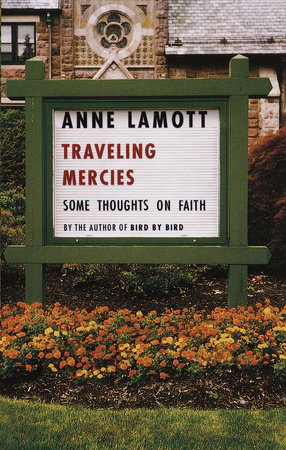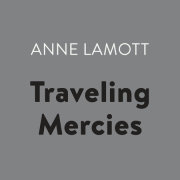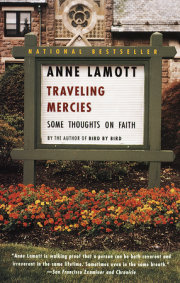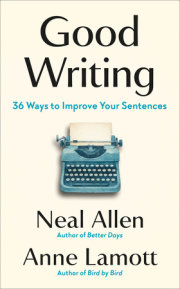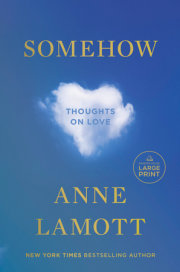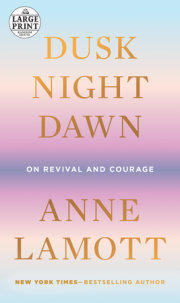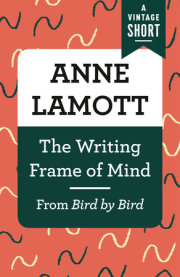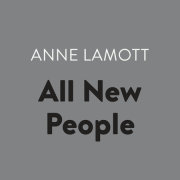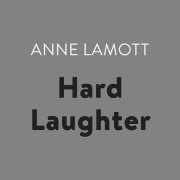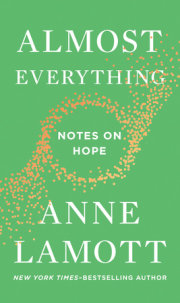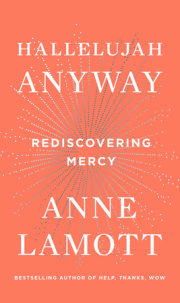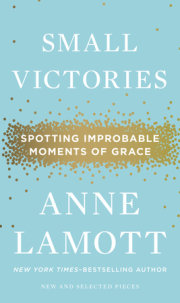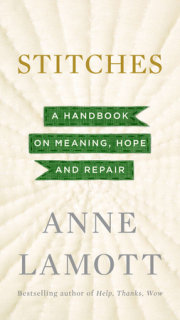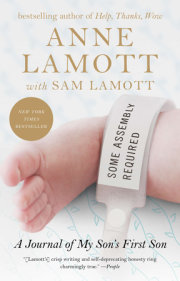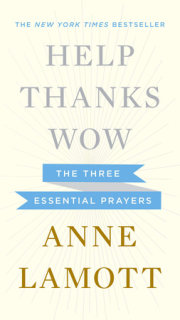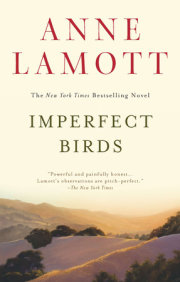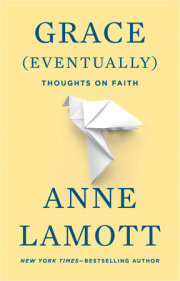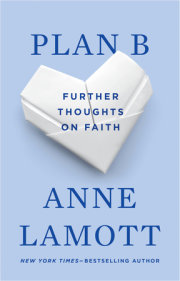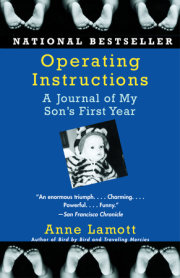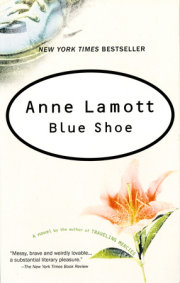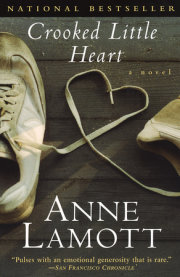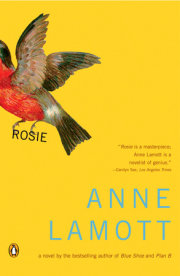My coming to faith did not start with a leap but rather a series of staggers from what seemed like one safe place to another. Like lily pads, round and green, these places summoned and then held me up while I grew. Each prepared me for the next leaf on which I would land, and in this way I moved across the swamp of doubt and fear. When I look back at some of these early resting places--the boisterous home of the Catholics, the soft armchair of the Christian Science mom, adoption by ardent Jews--I can see how flimsy and indirect a path they made. Yet each step brought me closer to the verdant pad of faith on which I somehow stay afloat today.
That One Ridiculous Palm The railroad yard below our house was ringed in green, in grass and weeds and blackberry bushes and shoulder-high anise plants that smelled and tasted of licorice; this wreath of green, like a cell membrane, contained the tracks and the trains and the roundhouse, where engines were repaired. The buildings rose up out of the water on the other side of the bay, past Angel Island, past Alcatraz. You could see the Golden Gate Bridge over to the right behind Belvedere, where the richer people lived; the anise was said to have been brought over at the turn of the century by the Italians who gardened for the people of Belvedere.
Tiburon, where I grew up, used to be a working-class town where the trains still ran. Now mostly wealthy people live here. It means shark in Spanish, and there are small sharks in these parts. My father and shy Japanese fishermen used to catch leopard sharks in the cold green waters of the bay.
There was one palm tree at the western edge of the railroad yard, next to the stucco building of the superintendent--one tall incongruous palm tree that we kids thought was very glamorous but that the grown-ups referred to as "that ridiculous palm tree." It did not belong, was not in relationship to anything else in town. It was silent and comical, like Harpo Marx with a crazy hat of fronds.
We took our underpants off for older boys behind the blackberry bushes. They'd give us things--baseball cards, Sugar Babies. We chewed the stems off the anise plants and sucked on them, bit the ends off nasturtiums and drank the nectar.
When I was five and six, my best friend was a Catholic girl who lived about fifteen minutes away, on foot, from our house--kids walked alone all over town back then. I loved the Catholic family desperately. There were dozens of children in that family, or maybe it just felt that way, babies everywhere, babies crawling out from under sofas like dust bunnies. We only had three kids in our family; my brother John, who is two years older than me and didn't like me very much back then, and my brother Stevo, who is five years younger than me, whom I always adored, and who always loved me. My mother nursed him discreetly, while the Catholic mother wore each new baby on her breasts like a brooch. The Catholic mama was tall and gorgeous and wore heels to church and lots of makeup, like Sophia Loren, and she had big bosoms that she showed off in stylish V-necked dresses from the Sears catalog. My mother was not much of a dresser. Also, she was short, and did not believe in God. She was very political, though; both she and Dad were active early on in the civil rights movement. My parents and all their friends were yellow-dog Democrats, which is to say that they would have voted for an old yellow dog before they would have voted for a Republican.
I was raised by my parents to believe that you had a moral obligation to try to save the world. You sent money to the Red Cross, you registered people to vote, you marched in rallies, stood in vigils, picked up litter. My mother used to take the Greyhound out to Marin City, which was a terrible ghetto then, and volunteer in an after-school program for boys and girls from impoverished families. She tutored kids in reading while other grown-ups worked with them in sports. My mother majored in the classics in college. She always brought along little paper candy cups filled with the fanciest candies from Blum's or the City of Paris to give to the children after their lessons. It used to make my father mad that she'd buy such expensive candies, but this didn't stop her.
My Catholic friend and I used to spend hours sitting on the couch with the latest Sears catalog spread across our knees, pretending that we got whatever was on our side of the page. I played this game with anxiety and grief, always thinking that the better dresses and shoes were on my friend's pages and that I would have been OK if they had just been on mine--
and if I'd had her tall stylish mother, with the wonderful cleavage showing like the bottom of a baby in her low necklines. I knew I was not pretty because people were always making jokes about my looks. (Once, at a pizza joint, a stranger had included me in a collective reference to the Catholic children, and you would have thought from the parents' outrage that he had included a chimpanzee.) And I knew I was not OK because I got teased a lot by strangers or by big boys for having hair that was fuzzy and white. Also, I got migraines. I got my first one midway through kindergarten and had to lie down with my face on the cool linoleum in the back of the room until my father could come get me.
My friend and I gathered blackberries from the bushes in the train yard, and her mother made pies. She made apple pies too. We peeled each apple with precision, aiming for one long green spiral of peel, and my first memory of watching someone be beaten was on a night after we'd prepared apples for pie. My Catholic friend and I had been left with a baby-sitter and all those babies, and after we had sliced up and spiced the apples, we'd gone to bed without throwing out all those green snakes of peel, and I awoke with a start in the middle of the night because my friend's father was smacking her on the face and shoulders, fuming alcohol breath on the two of us in our one twin bed, raging that we were slobs, and I don't know how he knew to beat her instead of me because I don't remember there being any light on. We both cried in the dark, but then somehow we slept and in the morning when we woke the mother was frying up bacon, a baby slung over her shoulder, and the dad was happy and buoyant, thunderous in his praise of the pie now in the oven.
It was Sunday morning and I got to go to church with them. All the children got dressed up. The parents looked like movie stars, so handsome and young, carrying babies, shepherding the bigger kids, smooching in the car.
I loved every second of Catholic church. I loved the sickly sweet rotting-pomegranate smells of the incense. I loved the overwrought altar, the birdbath of holy water, the votive candles; I loved that there was a poor box, and the stations of the cross rendered in stained glass on the windows. I loved the curlicue angels in gold paint on the ceiling; I loved the woman selling holy cards. I loved the slutty older Catholic girls with their mean names, the ones with white lipstick and ratted hair that reeked of Aqua Net. I loved the drone of the priest intoning Latin. All that life surrounding you on all four sides
plus the ceiling--it was like a religious bus station. They had all that stuff holding them together, and they got to be so conceited because they were
Catholics.Looking back on the God my friend believed in, he seems a little erratic, not entirely unlike her father--God as borderline personality. It was like believing in the guy who ran the dime store, someone with a kind face but who was always running behind and had already heard every one of your lame excuses a dozen times before--why you didn't have a receipt, why you hadn't noticed the product's flaw before you bought it. This God could be loving and reassuring one minute, sure that you had potential, and then fiercely disappointed the next, noticing every little mistake and just in general what a fraud you really were. He was a God whom his children could talk to, confide in, and trust, unless his mood shifted suddenly and he decided instead to blow up Sodom and Gomorrah.
My father's folks had been Presbyterian missionaries who raised their kids in Tokyo, and my father despised Christianity. He called Presbyterians "God's frozen people." My mother went to midnight mass on Christmas Eve at the Episcopal church in town, but no one in our family believed in God--it was like we'd all signed some sort of loyalty oath early on, agreeing not to believe in God in deference to the pain of my father's cold Christian childhood. I went to church with my grandparents sometimes and I loved it. It slaked my thirst. But I pretended to think it was foolish, because that pleased my father. I lived for him. He was my first god.
My mother and her twin sister had come over from Liverpool with their mother after their father died, when they were twelve. My mother had a lifelong compassion for immigrants; she used to find people waiting for boats to their homeland or waiting for money to be wired from the East so that they could catch a bus home, and she'd bring them to stay with us until everything was straightened out. She and my aunt Pat had been confirmed as Episcopalians in England--I have their confirmation picture on my mantel, two dark-haired beauties of twelve or so in long white baptismal-style dresses. But that was the last of their religious affiliation. My aunt Pat married a Jew, with a large Jewish family in tow, but they were not really into Moses Jews; they were bagelly Jews. My closest cousin was bar mitzvahed, but other than accusing you of anti-Semitism if you refused second helpings of my uncle Millard's food, they might as well have been Canadians.
None of the adults in our circle believed. Believing meant that you were stupid. Ignorant people believed, uncouth people believed, and we were heavily couth. My dad was a writer, and my parents were intellectuals who went to the Newport Jazz festival every year for their vacation and listened to Monk and Mozart and the Modern Jazz Quartet. Everyone read all the time. Mt. Tamalpais loomed above us, and we hiked her windy trails many weekends, my dad with binoculars hanging around his neck because he was a serious bird-watcher. He worshiped in the church of Allen Ginsberg, at the Roger Tory Peterson Holiness Temple, the Tabernacle of Miles Davis.
We were raised to believe in books and music and nature. My mother played the piano most weekend nights, and all of us kids knew the words to almost every song in the
Fireside Book of Folk Songs. When my parents' friends came over on the weekends and everyone had a lot to drink, my mother played piano and everyone sang: English ballads, spirituals, union songs, "The Golden Vanity," "Joe Hill," "Bread and Roses."
Their friends, our family friends, were like us; they read as a vocation, worked for liberal causes, loved Dr. King and nature, smoked, drank a lot, liked jazz and gourmet food. They were fifties Cheever people, with their cocktails and affairs. They thought practicing Catholics insane, ridiculous in their beliefs, and morally wrong to have so many children; also, the non-Italian Catholics were terrible cooks. My mother made curries surrounded by ten kinds of condiments, including chutney she and her friends made every year in our kitchen. I bowed my head in bed and prayed, because I believed--not in Jesus--but in someone listening, someone who heard. I do not understand how that came to be; I just know I always believed and that I did not tell a soul. I did not tell a soul that strange boys rode by on bikes shouting racist insults about my kinky hair, or that we showed our naked bodies to the big boys in exchange for baseball cards, or that the Catholic dad had beat his daughter, because I wanted to be loved, and so I stood around silently, bursting with hope and secrets and fear, all skin and bone and eyes, with a crazy hair crown like that one ridiculous palm.
Momcat The Belvedere Lagoon was a body of green water surrounded on all sides by luxurious homes, each with a dock from which you might swim or launch a small Sunfish or rowboat. My best friend from second grade on was named Shelly. She was blonde, pretty, and had a sister one year younger, whose best friend was a girl named Pammy who lived at the other end of the lagoon.
Shelly's mother was a Christian Scientist. My father thought the Christian Scientists were so crazy that they actually made the Catholics look good. I was no longer close to the Catholics, as we had moved by this time into an old stone castle on Raccoon Straits on the north shore of San Francisco Bay. The castle had been built a hundred years before by a German man who wanted to make his new bride feel at home in California. It had trapdoors, a dungeon, and two caves in the back. My parents had bought it for twenty thousand dollars the year John Kennedy became president. My parents campaigned for him, my father looked like him, my mother quivered for him. She was like the preacher in
Cold Comfort Farm whenever she talked about either of the Kennedys, trembling with indignant passion--"I'm
quivering for you, Jack"--as if the rest of us didn't also love him.
We lived in this marvelous castle, but things were not going well inside its stone walls. My parents' marriage was not a very happy one, and everywhere you looked as the sixties traipsed along there was too much alcohol and pot and infidelity. But Shelly's parents did not drink at all, and their house was full of stability and warmth. Pammy and I were drawn to it like moths. Pammy's mother was an heiress and an alcoholic who weighed no more than eighty pounds and who had often passed out before breakfast. Her father was doing time in various California prisons for killing his mother's best friend.
So we came to this house on the lagoon where everyone looked so good and where the mother gathered her children (and any other loose kids who happened to be there) into an armchair, like Marmie in
Little Women, and read to them from
Science and Health or the Bible. She told you that you were a perfect child, that you were entirely good, and that everything was fine, all evidence to the contrary. She was kind, lovely, funny, an early feminist who wore huge Bermuda shorts and her husband's shirts and did not care what people thought of her. And she believed two of the most radical ideas I had ever heard: one, that God was both our Father
and our Mother; and two, that I was beautiful. Not just in God's eyes, which didn't count--what's the point if Ed Sullivan was considered just as beautiful as Julie Christie? She meant physically, on the earth, a visibly pretty girl.
Now, I had skipped a grade, so I was a year younger than everyone else in my class, and at nine and ten and eleven was knee-knocking thin, with sharp wings for shoulder blades and wiry blonde hair that I wore short. All my life men had been nudging my dad and saying with great amusement that there must have been a nigger in the woodpile, I guess because of both the hair and my big heavy-lidded eyes. And my father, who never once in his life would have used the word
nigger, would smile and give an almost imperceptible laugh--not a trace of rage on behalf of black people, not a trace of rage on behalf of me. I didn't even quite know what this phrase meant--I knew it meant that a black man must have been my father but I couldn't figure out how a woodpile figured in, since a woodpile housed only the most terrible things: snakes, spiders, rats, vermin, grub. The one time my older brother used the word
nigger, he was grounded for a week. But when men whispered it to my father, he let it go. Why was this? Why would old lefties make this joke, and why would my dad act amused? Was it like spitting, a bad-boy thing? Did it make them feel tough for the moment, like rednecks for a day, so they could briefly sport grossness and muscles?
Lee, the Christian Science mother, smoothed my hair with her grandmother's boar-bristle brush, instead of tearing at it with a comb. She said that half the women in Belvedere would pay their beauticians anything for my hair's platinum color, and the roses in my cheeks, and the long skinny brown legs that carried me and her daughter into endless victories on the tennis courts.
Shelly was my first doubles partner. We were tennis champs.
It was so strange to be with families who prayed before the children left for school each day, before swim meets and work and tennis tournaments. Pammy would step over her mother on the way out the door and arrive at Shelly's house just as I did. At my house, no one had passed out on the floor, but my mom was scared and Dad was bored and my little brother was growing fat and my older brother
was being called by the siren song of the counterculture. Pammy and I would walk in together and find Lee with her brood piled like puppies on top of her, in her armchair, reading the Bible. And she would pray for us all.
Shelly's house was the only place I could really sleep. At my own, I'd try to but would feel a threatening darkness hanging over the castle, as if my parents' bad marriage were casting shadows like giant wings--shadows of alcoholism, shadows of people at my parents' frequent parties who necked in our rooms with people who were married to somebody else. If I told my mom or dad, they said, Oh, honey,
stop, that's ridiculous, or they explained that everyone had had a lot to drink, as if what I'd seen didn't count since it had sprung from a kind of accidental overdose. At Christmas there were Fishhouse punches so alcoholic you could have sterilized needles in them, and on hot summer nights, blenders full of frappeed whiskey sours. The kids were given sips or short glasses of drinks, and we helped ourselves to more. By the age of twelve, all three of us were drinking with some regularity. My mother did not drink very much and so was frappe herself a lot; she was trying to earn the money for law school, which was her dream, and trying to get my dad to want to stay, and she looked tired, scared, unhappy. But Pammy's mother made mine look like Julie Andrews in
The Sound of Music.Many of the houses on the lagoon held children who by thirteen were drinking and using pot, LSD, cocaine, and heroin. Five children I knew well from school or the tennis courts died in the sixties--three of overdose, one by hanging, and the boy who lived directly across the lagoon drowned in its cool waters.
I remember how disgusted my parents were whenever they heard that Lee had taken her kids in to see a practitioner, instead of an M.D., when they got sick, as if she had entrusted her kids to a leech specialist. They were hardly ever sick, though. I don't think they even got poison oak. I was sick much more often than Shelly was. My mother was always basting at least one of us kids with calamine lotion. I remember being sick with chest colds and croup, sitting on my mother's lap on the toilet seat while scalding water from the shower filled the room with steam, characters in a hot, misty fairy tale, breathing together till I was better.
Pammy and I basked in Lee's love like lizards on sunny rocks. Lee lay beside me in bed when I couldn't sleep and whispered the Twenty-third Psalm to me: "'The Lord is my shepherd, I shall not want'--I am not wanting for anything, Annie. Let's find a green pasture inside us to rest in. Let's find the still waters within." She'd lay beside me quietly for a while as we listened to the tide of the lagoon lap against the dock. Then she'd go on: "'Yea, though I walk
through the valley of the shadow of death,' Annie, not 'Yea, as I end up living forever in the valley. . . .'" And she prayed for the Good Shepherd to gather my thoughts like sheep. I did not quite believe in the power of her Mother-Father God, because my frightened lamby thoughts seemed to be stampeding toward a wall, piling up on each other's backs, bleating plaintively while their wild eyes darted around frantically. But I believed in Lee, and I felt her arms around me. I could hear Shelly's even breathing in the next bed, sense Lee's younger daughter and Pammy asleep in the next room, and the whole house would be so quiet, no shadows at all, and Lee would whisper me to sleep.
. All rights reserved. No part of this excerpt may be reproduced or reprinted without permission in writing from the publisher.

